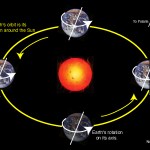facts
With Halloween quickly approaching, I thought it would be fun to take some time to appreciate bats. Amazing animals!
"In the depth of winter I finally learned that there was in me an invincible summer." -Albert Camus
As the year draws to a close, we approach a very special time of year, at least from an astronomical perspective. This Saturday, December 21st, will mark the Winter Solstice in the Northern Hemisphere (or the Summer Solstice in the Southern), or the date where the Earth's axis is tilted its maximal amount away from (or towards) the Sun, as viewed from an observer in the Northern (or Southern) Hemisphere.
Image credit: Mrs. Snyder at the Seven Hills School.
While it's pretty common knowledge…
"Get your facts first, then you can distort them as you please." -Mark Twain
I am unimpressed with speculations that have no basis in fact, but if you can show how your claims are factually grounded and arrived at, they're certainly worth a listen to. And if your facts, logic and extrapolations are sound, you might even, as Sarah Jarosz sings,
Tell Me True.
Of course, if they're a little suspect instead, you can either lead people astray, or alternatively, create some of the best humor and satire ever created.
This weekend, I proudly introduce to you a series of nature videos by YouTube…
tags: atheists, atheism, famous atheists, satire, zakiechan, streaming video
This video is NOT an argument for atheism... It's a defense of atheists from right-wing religious -- christian, muslim, jewish and other fundamentalist -- hate-mongers. This video received the award for "Excellence in Humanist Communications" from the Harvard University Humanist Chaplaincy.
As I put it at a blogging panel last fall, "in science, it is normative to be not sure." It wasn't my most eloquent moment, but at least AAAS' president-elect Alice Huang agrees with me that one of the biggest challenges to public science literacy is understanding the contingent nature of scientific "truth".
But probably the most difficult concept to get across to nonscientists is that we look at data and then use probabilities to judge those data. The public wants an absolute black-and-white answer. We may look at something that is 80 percent likely as being good enough to base decisions on…
